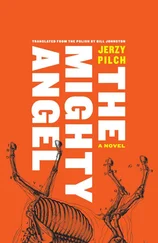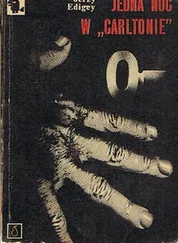“For the first time in my life, I look her right in the eyes, and so, it seems to me that her eyes, too, had only now been called into existence. For the first time in my life, I look a female student in the eyes, and, for the first time in my life, I see gray lightning bolts. In the classroom, it is as quiet as the grave. The quiet before the storm. But no one knows that it will be a storm full of gray lightning bolts, and that it will be a storm raging in my heart.
“‘In other words, when I say that I didn’t read a single book, from the professor’s point of view I am telling the truth. But my admission is none of the professor’s business, nor where I go for the holidays. I am a Lutheran, and I am certainly a better Lutheran than your Żeromski, who converted to Lutheranism only in order to get a divorce. But he is buried in the Protestant cemetery, and, if only for that reason, you ought to have respect for us, and not ridicule us for lacking iodine — in other words, for having a screw loose.’”
My collocutor, or rather, my narrator, interrupted his story; he poured some more into the glasses, and he drank it off, without raising a toast or even checking to see whether I would join him; and he poured again, and he drank again; he made a motion as if he wished to take off his jacket, but then shrugged it off, lit a cigarette, inhaled two times or so, and looked me in the eye.
“Yes sir!” Gray. She had eyes like mine, like my father’s, like my brother’s, and, funny thing, like those of my departed wife. Very funny, but also slightly terrifying. One of a thousand very funny, but also slightly terrifying, details. If I knew how to capture all of them, I could write a shocking love story. The very first scene, the very beginning of emotion — seemingly nothing: the boorish professor and the desperate snot-nosed kid, but what an avalanche, what a cataclysm, what an earthquake. In my absolute confusion, I was certain that she, in a sudden illumination, knows everything, that she saw my sudden infatuation as clearly as can be, and she came out with — God help us — the story of Żeromski’s Lutheranism, which was, in fact, lined with a romantic plot turn, in order to finish me off with an ostentatious allusion.
“As a non-believer, I’m not crazy about either Catholics or Lutherans, and I’m especially not crazy about Lutherans. Why? Because I know you. I know you better than the Catholics. As the author of The Natural History of the Cieszyn Land , I have come to know, inside and out, all — as you would put it — the Lutheran phantoms. Lutherans are more convenient for caricature and derision. To make fun of Catholics in Poland is a shallow art. Lutheranism, through its exoticism, lends to an anecdote an additional — I would say — aesthetic force. Besides, in my agnostic opinion, in matters of faith and God, Lutherans are more right than Catholics. And whoever is more right is more comical. It’s an old truth. The most ludicrous are those who are right a hundred percent of the time. May the Lord God defend us from those who own one-hundred-percent infallibility. My truth is as old as the world: there is no God. We are mayflies who have learned how to build Gothic churches, fly into the cosmos, and compose symphonies. We are mayflies who have written the Bible, painted The Final Judgment , and made films with Greta Garbo. We are mayflies who elect the pope, and we are mayflies who sometimes withdraw our allegiance from the pope. We are mayflies who turn to dust after death, and we are mayflies who are capable of composing a sentence about that turning to dust. And please do not protest and assert that mayflies who have constructed violins and are capable of composing string quartets are not mayflies. All the more are they mayflies. All the more tragically — mayflies. Sometimes, when great misfortune incapacitates us, it seems to us that there exists something more; it seems to us that we see or hear signs: a light over a house, a knocking at the window, the cry of a child in the garden… Perhaps you know that, in a certain piece of biblical apocrypha, one of Job’s clones utters the sentence: ‘Suffering incapacitates me like a crying child?’ We are all clones of Job. Our appearance has been altered in the hands of the demon of fate. We are all mayflies. We are mayflies, who suffer from a lack of iodine.
“No. I never asked her to forgive me. Broad anti-Lutheran jokes were, in my classes, a daily affair. My joke about the connection between iodine and Lutheranism was nothing exceptional. The exception was the fact that she talked back. And of course it was exceptional, and even very exceptional, that — when she mouthed off — I fell in love with her. As far as that joke is concerned, to this day I believe that I am right. To this day, I believe that Lutheranism plus the lack of iodine is an intellectual tragedy. You can prove this, if only through negation. For you can turn the matter around and say legitimately that Lutheranism plus iodine is an intellectual, and not only intellectual, fulfillment. Just why is it that Protestantism enjoys all sorts of triumphs, for example, in Scandinavia? Well, it is precisely because those are maritime countries and full of iodine. Scandinavian Protestantism, my dear sir, is the height of democratic freedom, economic efficiency, and intellectual power. Unfortunately, you can’t say the same about Beskid Mountain Protestantism.
“I interrupted the lesson and left the classroom. I told the head of school that I wasn’t feeling well, and that wasn’t a lie in the least. I didn’t feel well. Not at all well. I shut myself up at home, having covered the windows tightly, and put on a CD with the sonatas of Franz Schubert, and I drank, in the course of the afternoon and night, three bottles of vodka, pure vodka, if you please. It went down like water. The best proof is this: in the morning, as if nothing had happened, I was off to school. Not that I was happy as a lark and in a perfect mood. Not at all! Ill treated, dejected, with a pierced heart, but still as if nothing had happened. Each subsequent day, it was as if nothing had happened. Life went on as if nothing had happened. I conducted my lessons and performed all my obligations according to routine. I limited the number of anti-Lutheran jokes during my lessons, but I didn’t give them up entirely. I never returned to the aforementioned incident. I took great care not to betray my emotions, in other words not to be especially severe with her. It is well known that showing affection is most generally, and most ineptly, masked with brutality. I tried not to make that mistake, and I think I was successful. For a time, of course. In the evenings, I would get drunk, and then I would allow myself embarrassing scenes. I imagined that we were doing together all those things that make for a great love: we go to the movies, we eat suppers, we play chess, we watch detective programs on television. I staged in my mind our shocking conversations about what we needed to buy for the house, when we would finally decide to remodel the bathroom, and where we would go for vacation. With complete detachment from this world, I began to believe that we would be accepted, that our neighbors, and, in general, all the inhabitants of K., would respect the uniqueness and beauty of our story. Sometimes a drunken blubbering accompanied my amorous cantos, but everything was done behind closed doors, in isolation, as a conspiracy of one. And she? Nothing. To be honest, it isn’t worth talking about her. If it weren’t for the fact that I had fallen in love with her, there wouldn’t be anything to talk about at all. You couldn’t even say that my love had lent her a glow, or something like that. Rather, on the contrary. What hadn’t been extinguished up to then, now went out. The eyes went out. I avoided the gray fire. I was to see how they burn only one more time. Only once. Altogether, two times. For a shocking love, this is not, you must admit, an excessively overwhelming result.
Читать дальше












